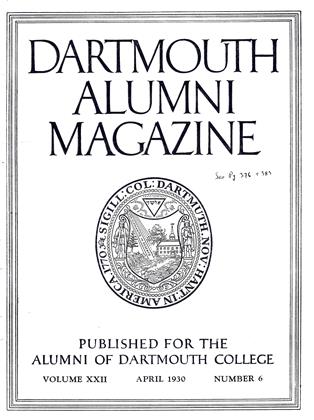It is impossible to print here, much as the editors would,like to, the tributes which have come to the MAGAZINE con-cerning Eugene Francis Clark. Telegrams, letters, reso-lutions, and even printed articles have been sent in butmany of them are of such a nature as to be private, personalexpressions of admiration and sorrow. The regrets ofmembers of the American Alumni Council, alumni associations, former students, business men, and groups invarious parts of America and even Europe, including dispatches from England, France and Poland, all pay tributeto a college official universally esteemed and loved. Dr.Daniel A. Poling who spoke the eulogy at the funeral hereexpresses most of the sentiments in the hearts of ProfessorClark's friends. Added to this may be now stated the estimation and warm friendship that existed among the editorson the board of the ALUMNI MAGAZINE.
EUGENE Francis Clark was the son of a great tradition. He came of a blood stream enriched by Pilgrim spirit and achievement. He had the poise and charm of scholarship and true culture; the executive ability not always associated with those other more distinctive attributes of the teacher and a genius for friendship born of a trained mind and an understanding heart. His character was at once an inheritance and an achievement. As I have talked with those who loved him best and with his close associates here; as I have read the words of undergraduates and the exquisite tribute of President Hopkins, and as I recall my own brief glimpses of him across the hurrying years, I know that he will be missed and remembered because of what he was.
By every reason that we know, Eugene Clark died too soon. But how little we know and how great is the hunger of a heart,
"For the touch of a vanished hand And the Sound of a voice that is still."
(Dr. Poling then offered the following prayer:)
Oh, thou strong Son of God, Comrade of our struggles,Comforter of our sorrows, we thank Thee for so true a manand -pray that through our days we too may live for others.Especially do our hearts go out to those who are bereft ofson and father. May they and all others who mourn withthem be precious in Thy sight. And may the memory ofEugene Francis Clark be for Dartmouth across all thecoming years, like a sun gone down and leaving behind asky "luminous long after it is out of sight": We bringour prayer in the name of "Him whom having not seen welove"—Amen.
Yes, by every human reason, Gene Clark died too soon. But neither life nor death can be rationalized, nor can the qualities of the soul. I shall never find a friendship at the bottom of a crucible and love is forever a mixture too subtle for a test tube—but they are real. There is a higher reason: I believe that he finished here to begin there, that "now we see through a glass darkly, but then face to face": that this life is but "the childhood of our immortality" and that Addison sang the song of the ages:
"It must be so, Plato, thou reasonest well. Else whence this pleasing hope, this fond desire . . . The stars shall fade, The sun himself grow dim with age, And nations sink in years: But thou shalt flourish in immortal youth, Unhurt amidst the war of elements, The wreck of matter and the crash of worlds."
Then we shall sorrow but "not as those who are without hope," for ours is a faith that in the night of death "sees a star" and listening "hears the rustle of a wing." Ours is a faith that claims the promise, "Let not your heart be troubled ... Ye believe in God, believe also in me ... I will not leave you comfortless ... I will come to you . . . Igo to prepare a place for you."
Ours is a faith that leaves him not beneath the winter's clod, but follows him to fulfillment and reunion reunion with that other Dartmouth man, his father, who won great spiritual triumphs and a shrine in the heart of youth. Aye, and reunion with her whose heart was golden and whose song was lovelier than a sunset.
"I tell you they have not died, Their hands clasp yours and mine; They are but glorified, They have become divine."
 View Full Issue
View Full Issue
More From This Issue
-
 Lettter from the Editor
Lettter from the EditorEditorial Comment
April 1930 -
 Sports
SportsFootball at Dartmouth Since the War
April 1930 By Professor James P. Richardson -
 Article
ArticleThe Rough-and-Ready Eighties
April 1930 By William A. Bartlett '82 -
 Class Notes
Class NotesCLASS OF 1908
April 1930 By A. B. Rotch -
 Article
ArticleIntercollegiate Keys to Hospitality
April 1930 By Craig Thorn, Jr. -
 Class Notes
Class NotesCLASS OF 1901
April 1930 By Everett M. Stevens







